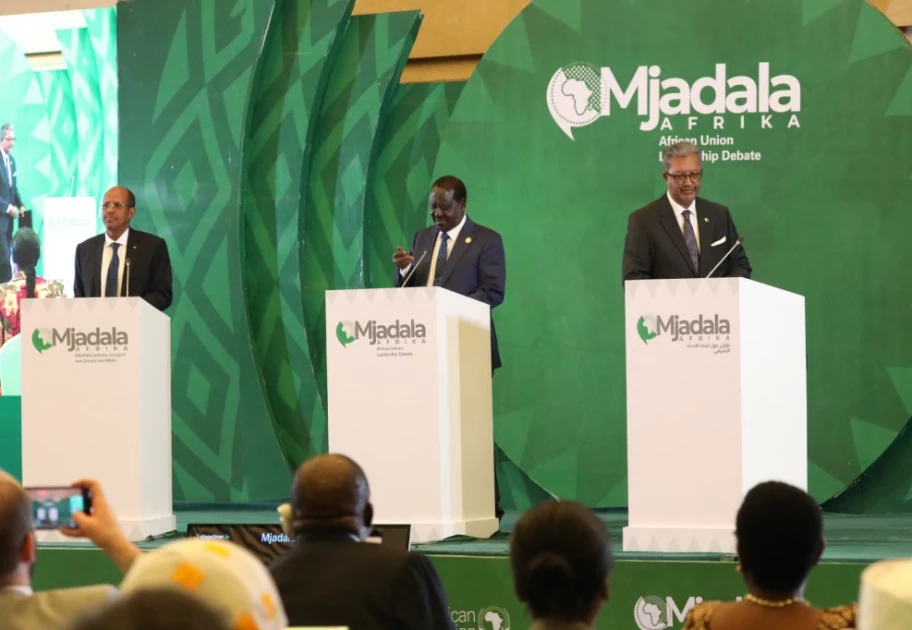
Our Correspondent | Africa Guardian
The Mjadala Afrika debate held in Addis Ababa provided a compelling look into the future of African Union (AU) leadership, where candidates for the African Union Commission (AUC) Chairperson shared their ambitious visions to tackle the continent’s challenges and harness its opportunities. One of the key themes that emerged was Africa’s growing relationship with China and the need for innovative strategies and partnerships for sustainable development.
China’s transformative influence on Africa’s development was a major focus of the debate. As one of Africa’s most significant economic partners, China has contributed to vital infrastructure projects, such as expansive railways and state-of-the-art energy plants. The Belt and Road Initiative (BRI), launched in 2013, has injected billions of dollars into African economies, fostering growth and enhancing connectivity across regions. A prime example is the $4 billion Addis Ababa-Djibouti Railway, which has substantially boosted trade and mobility in East Africa.
The candidates—Raila Odinga from Kenya, Mahmoud Ali Youssouf from Djibouti, and Richard Randriamandrato from Madagascar—expressed optimism about the potential of Africa-China partnerships. They recognized that these collaborations have spurred technological advancements and economic growth in several African countries. However, they also agreed on the importance of ensuring that these partnerships remain balanced, aligned with Africa’s long-term development goals, and supportive of the continent’s financial autonomy and stability.
Raila Odinga emphasized the importance of learning from successful global models, specifically the European Union, to strengthen Africa’s governance and institutional frameworks. He pointed to the EU’s high level of internal trade—over 60% of its trade happens within the union—as a practice that Africa could emulate. In contrast, intra-Africa trade made up only 16.6% of total trade in 2021, according to the African Export-Import Bank. Odinga’s support for the African Continental Free Trade Area (AfCFTA) reflected his belief that increasing intra-African trade could unlock the continent’s economic potential and create inclusive growth opportunities.
Richard Randriamandrato brought forward a proposal to integrate modern technologies to enhance transparency and accountability within AU institutions. He suggested utilizing digital platforms to monitor and evaluate the progress of Agenda 2063, Africa’s long-term transformative agenda. Such advancements, he argued, would increase trust among African citizens and international partners while accelerating the implementation of key projects. Randriamandrato’s call for fiscal discipline and streamlined operations within the AU reflected his dedication to maximizing resource efficiency in achieving Africa’s ambitious goals.
Mahmoud Ali Youssouf also emphasized strengthening intra-Africa collaboration for self-reliance. He advocated for the removal of barriers to trade, improved transport infrastructure, and enhanced digital connectivity. The AfCFTA, which aims to increase intra-African trade by 52% by 2025, was recognized as a game-changing initiative. The candidates agreed that its successful implementation could reduce Africa’s dependence on external partners and create a more interconnected and resilient economy.
The debate also touched on the need to address shared challenges such as climate change, health crises, and peacebuilding. Africa’s resilience in the face of climate adversity, despite contributing less than 4% of global greenhouse gas emissions, was celebrated as a testament to the continent’s innovation and perseverance. Youssouf proposed the creation of a continent-wide research and innovation hub to develop solutions tailored to Africa’s unique environmental and socio-economic challenges. This vision aligns with ongoing AU initiatives, such as the African Medicines Agency, which seeks to improve health emergency response and medical access across the continent.
The Mjadala Afrika debate revealed a shared vision for Africa’s future, focusing on partnerships that promote innovation, equity, and mutual growth. While China’s involvement in Africa will continue to play a significant role, African leaders are committed to approaching these partnerships with strategic foresight. The focus on adopting best practices from other regions and deepening intra-Africa collaboration reflects a dedication to the goals set out in Agenda 2063.
As the AU prepares to elect its next Chairperson in February 2025, the proposals discussed at Mjadala Afrika offer a clear roadmap for Africa’s future. The next leader will have the crucial task of turning these ideas into actionable policies, driving Africa toward greater integration, prosperity, and self-reliance. The Mjadala Afrika debate has been more than just a political conversation—it has been a beacon of hope, shedding light on Africa’s vast potential and the power of unity. Africa’s journey toward a brighter tomorrow is indeed full of promise.
___
